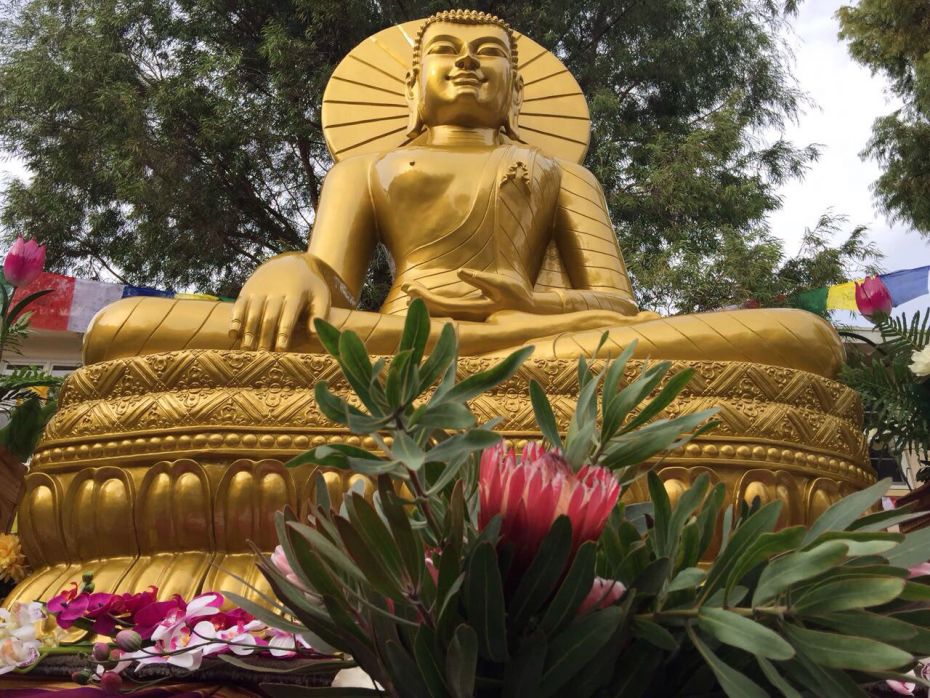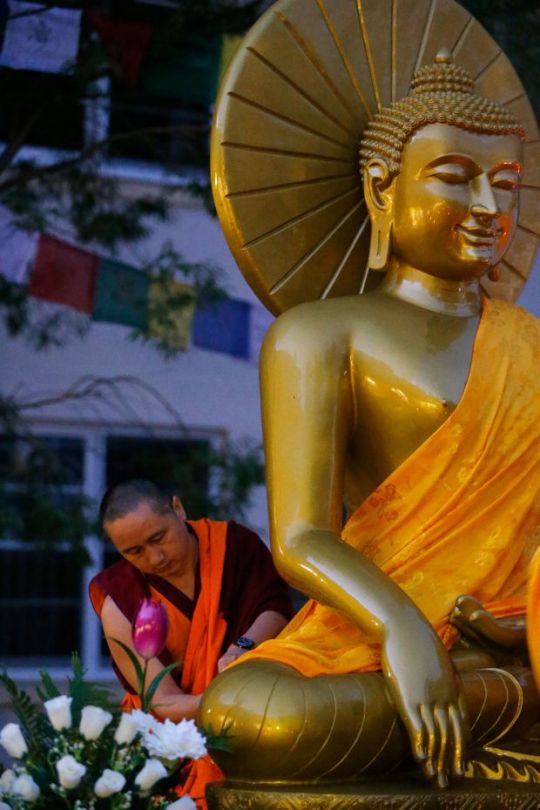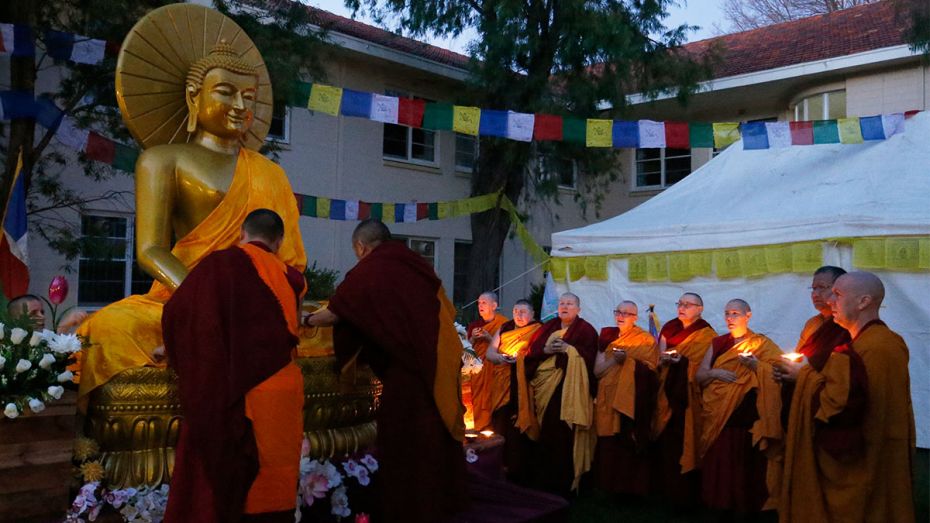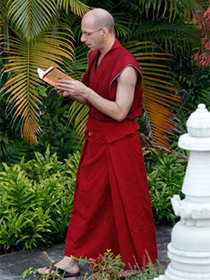- Home
- FPMT Homepage
Foundation for the Preservation of the Mahayana Tradition
The FPMT is an organization devoted to preserving and spreading Mahayana Buddhism worldwide by creating opportunities to listen, reflect, meditate, practice and actualize the unmistaken teachings of the Buddha and based on that experience spreading the Dharma to sentient beings. We provide integrated education through which people’s minds and hearts can be transformed into their highest potential for the benefit of others, inspired by an attitude of universal responsibility and service. We are committed to creating harmonious environments and helping all beings develop their full potential of infinite wisdom and compassion. Our organization is based on the Buddhist tradition of Lama Tsongkhapa of Tibet as taught to us by our founders Lama Thubten Yeshe and Lama Thubten Zopa Rinpoche.
- Willkommen
Die Stiftung zur Erhaltung der Mahayana Tradition (FPMT) ist eine Organisation, die sich weltweit für die Erhaltung und Verbreitung des Mahayana-Buddhismus einsetzt, indem sie Möglichkeiten schafft, den makellosen Lehren des Buddha zuzuhören, über sie zur reflektieren und zu meditieren und auf der Grundlage dieser Erfahrung das Dharma unter den Lebewesen zu verbreiten.
Wir bieten integrierte Schulungswege an, durch denen der Geist und das Herz der Menschen in ihr höchstes Potential verwandelt werden zum Wohl der anderen – inspiriert durch eine Haltung der universellen Verantwortung und dem Wunsch zu dienen. Wir haben uns verpflichtet, harmonische Umgebungen zu schaffen und allen Wesen zu helfen, ihr volles Potenzial unendlicher Weisheit und grenzenlosen Mitgefühls zu verwirklichen.
Unsere Organisation basiert auf der buddhistischen Tradition von Lama Tsongkhapa von Tibet, so wie sie uns von unseren Gründern Lama Thubten Yeshe und Lama Thubten Zopa Rinpoche gelehrt wird.
- Bienvenidos
La Fundación para la preservación de la tradición Mahayana (FPMT) es una organización que se dedica a preservar y difundir el budismo Mahayana en todo el mundo, creando oportunidades para escuchar, reflexionar, meditar, practicar y actualizar las enseñanzas inconfundibles de Buda y en base a esa experiencia difundir el Dharma a los seres.
Proporcionamos una educación integrada a través de la cual las mentes y los corazones de las personas se pueden transformar en su mayor potencial para el beneficio de los demás, inspirados por una actitud de responsabilidad y servicio universales. Estamos comprometidos a crear ambientes armoniosos y ayudar a todos los seres a desarrollar todo su potencial de infinita sabiduría y compasión.
Nuestra organización se basa en la tradición budista de Lama Tsongkhapa del Tíbet como nos lo enseñaron nuestros fundadores Lama Thubten Yeshe y Lama Zopa Rinpoche.
A continuación puede ver una lista de los centros y sus páginas web en su lengua preferida.
- Bienvenue
L’organisation de la FPMT a pour vocation la préservation et la diffusion du bouddhisme du mahayana dans le monde entier. Elle offre l’opportunité d’écouter, de réfléchir, de méditer, de pratiquer et de réaliser les enseignements excellents du Bouddha, pour ensuite transmettre le Dharma à tous les êtres. Nous proposons une formation intégrée grâce à laquelle le cœur et l’esprit de chacun peuvent accomplir leur potentiel le plus élevé pour le bien d’autrui, inspirés par le sens du service et une responsabilité universelle. Nous nous engageons à créer un environnement harmonieux et à aider tous les êtres à épanouir leur potentiel illimité de compassion et de sagesse. Notre organisation s’appuie sur la tradition guéloukpa de Lama Tsongkhapa du Tibet, telle qu’elle a été enseignée par nos fondateurs Lama Thoubtèn Yéshé et Lama Zopa Rinpoché.
Visitez le site de notre Editions Mahayana pour les traductions, conseils et nouvelles du Bureau international en français.
Voici une liste de centres et de leurs sites dans votre langue préférée
- Benvenuto
L’FPMT è un organizzazione il cui scopo è preservare e diffondere il Buddhismo Mahayana nel mondo, creando occasioni di ascolto, riflessione, meditazione e pratica dei perfetti insegnamenti del Buddha, al fine di attualizzare e diffondere il Dharma fra tutti gli esseri senzienti.
Offriamo un’educazione integrata, che può trasformare la mente e i cuori delle persone nel loro massimo potenziale, per il beneficio di tutti gli esseri, ispirati da un’attitudine di responsabilità universale e di servizio.
Il nostro obiettivo è quello di creare contesti armoniosi e aiutare tutti gli esseri a sviluppare in modo completo le proprie potenzialità di infinita saggezza e compassione.
La nostra organizzazione si basa sulla tradizione buddhista di Lama Tsongkhapa del Tibet, così come ci è stata insegnata dai nostri fondatori Lama Thubten Yeshe e Lama Zopa Rinpoche.
Di seguito potete trovare un elenco dei centri e dei loro siti nella lingua da voi prescelta.
- 欢迎 / 歡迎
简体中文
“护持大乘法脉基金会”( 英文简称:FPMT。全名:Foundation for the Preservation of the Mahayana Tradition) 是一个致力于护持和弘扬大乘佛法的国际佛教组织。我们提供听闻,思维,禅修,修行和实证佛陀无误教法的机会,以便让一切众生都能够享受佛法的指引和滋润。
我们全力创造和谐融洽的环境, 为人们提供解行并重的完整佛法教育,以便启发内在的环宇悲心及责任心,并开发内心所蕴藏的巨大潜能 — 无限的智慧与悲心 — 以便利益和服务一切有情。
FPMT的创办人是图腾耶喜喇嘛和喇嘛梭巴仁波切。我们所修习的是由两位上师所教导的,西藏喀巴大师的佛法传承。
繁體中文
護持大乘法脈基金會”( 英文簡稱:FPMT。全名:Found
ation for the Preservation of the Mahayana Tradition ) 是一個致力於護持和弘揚大乘佛法的國際佛教組織。我們提供聽聞, 思維,禪修,修行和實證佛陀無誤教法的機會,以便讓一切眾生都能 夠享受佛法的指引和滋潤。 我們全力創造和諧融洽的環境,
為人們提供解行並重的完整佛法教育,以便啟發內在的環宇悲心及責 任心,並開發內心所蘊藏的巨大潛能 — 無限的智慧與悲心 – – 以便利益和服務一切有情。 FPMT的創辦人是圖騰耶喜喇嘛和喇嘛梭巴仁波切。
我們所修習的是由兩位上師所教導的,西藏喀巴大師的佛法傳承。 察看道场信息:
- FPMT Homepage
- News/Media
-
- Study & Practice
-
-
- About FPMT Education Services
- Latest News
- Programs
- New to Buddhism?
- Buddhist Mind Science: Activating Your Potential
- Heart Advice for Death and Dying
- Discovering Buddhism
- Living in the Path
- Exploring Buddhism
- FPMT Basic Program
- FPMT Masters Program
- FPMT In-Depth Meditation Training
- Maitripa College
- Lotsawa Rinchen Zangpo Translator Program
- Universal Education for Compassion & Wisdom
- Online Learning Center
-
- Prayers & Practice Materials
- Overview of Prayers & Practices
- Full Catalogue of Prayers & Practice Materials
- Explore Popular Topics
- Benefiting Animals
- Chenrezig Resources
- Death & Dying Resources
- Lama Chopa (Guru Puja)
- Lama Zopa Rinpoche: Compendium of Precious Instructions
- Lama Zopa Rinpoche: Life Practice Advice
- Lama Zopa Rinpoche Practice Series
- Lamrim Resources
- Mantras
- Prayer Book Updates
- Purification Practices
- Sutras
- Thought Transformation (Lojong)
- Audio Materials
- Dharma Dates - Tibetan Calendar
- Translation Services
- Publishing Services
- Ways to Offer Support
- Prayers & Practice Materials
-
- Teachings and Advice
- Find Teachings and Advice
- Lama Zopa Rinpoche Advice Page
- Lama Zopa Rinpoche: Compendium of Precious Instructions
- Lama Zopa Rinpoche Video Teachings
- ༧སྐྱབས་རྗེ་བཟོད་པ་རིན་པོ་ཆེ་མཆོག་ནས་སྩལ་བའི་བཀའ་སློབ་བརྙན་འཕྲིན།
- Podcasts
- Lama Yeshe Wisdom Archive
- Buddhism FAQ
- Dharma for Young People
- Resources on Holy Objects
- Teachings and Advice
-
-
*If a menu item has a submenu clicking once will expand the menu clicking twice will open the page.
-
-
- Centers
-
- Teachers
-
- Projects
-
-
-
-
*If a menu item has a submenu clicking once will expand the menu clicking twice will open the page.
-
-
- FPMT
-
-
-
-
-
Our problem is that inside us there’s a mind going, ‘Impossible, impossible, impossible. I can’t, I can’t, I can’t.’ We have to banish that mind from this solar system. Anything is possible; everything is possible. Sometimes you feel that your dreams are impossible, but they’re not. Human beings have great potential; they can do anything. The power of the mind is incredible, limitless.
Manjushri Institute, 1977, Currently unpublished
Lama Yeshe Wisdom ArchiveShare
Lama Thubten Yeshe
-
-
-
- Shop
-
-
-
The Foundation Store is FPMT’s online shop and features a vast selection of Buddhist study and practice materials written or recommended by our lineage gurus. These items include homestudy programs, prayers and practices in PDF or eBook format, materials for children, and other resources to support practitioners.
Items displayed in the shop are made available for Dharma practice and educational purposes, and never for the purpose of profiting from their sale. Please read FPMT Foundation Store Policy Regarding Dharma Items for more information.
-
-
17

Buddha statue prior to offering gold-leaf at the Guru bumtsog, Hobart, Tasmania, June 2016. Photo courtesy of Stephanie Brennan.
In June 2017 FPMT in Australia (FPMTA) and Chag Tong Chen Tong Tibetan Buddhist Centre (CTCT) organized 100,000 tsog offerings to Guru Rinpoche, also known as a “Guru bumtsog.” Participants from all over Australia took part in the powerful and joyous multi-day event, which was blessed by a video address from Lama Zopa Rinpoche.
Here, Stephanie Brennan, FPMTA National Education/Tour Coordinator, shares a personal account of the Guru bumtsog, which took place during Saka Dawa in Hobart, Tasmania.
FPMT in Australia decided in December 2016 to organize a national 100,000 tsog offerings to Guru Rinpoche puja, inspired by the advice of FPMT spiritual director Lama Zopa Rinpoche. We wanted to connect strongly to Rinpoche and to offer the puja for the long lives of His Holiness the Dalai Lama and Rinpoche. We also wished to dedicate the puja for world peace.
This was the first time that this event would be offered in our region. Chag Tong Chen Tong Tibetan Buddhist Centre in Hobart generously co-hosted the event. Tasmania, with its pure air, World Heritage wildernesses, and mountains, and Hobart, with its award-winning restaurants, organic produce, and heritage areas, are very popular tourist destinations.
Hobart hosts an active community of artists and designers who are inspired by Tasmania’s natural environment, and Kickstart Arts, an organization dedicated to community art, partnered with FPMTA and CTCT to serve as the event venue.
A large geodesic white dome was erected in the garden next to where CTCT’s three-meters [ten-feet] high golden Shakyamuni Buddha statue was placed. The golden Buddha formed the focus of the event—a place where we offered silken robes, gold-leaf, and incense. Every evening as darkness fell, we circumambulated while chanting and made the sur offering around a fierce fire. Early each morning, we started by offering tea lights to the large stupa set up in the middle of the dome, the flickering flames lighting our faces in the shadows before the sun rose.
Inside the venue, the gompa was resplendent—luminous with Kickstart’s theatrical lighting, which shone on the rich brocades, thangkas, silk buntings, khatas, and holy images that covered the walls and ceiling, and illuminated tables of beautiful tsog offerings and long lines of water bowl, light, incense, food, and flower offerings.

Offering robes to the Buddha statue during the Guru bumtsog, Hobart, Tasmania, June 2016. Photo courtesy of FPMT Stephanie Brennan.
At the front of the room was a high throne covered in beautiful brocades, holding images of His Holiness and Lama Zopa Rinpoche. There were beautiful crystal bowls overflowing with gold-covered chocolates and mandala offerings on silken cushions. The stage was filled with exquisite tsog—wrapped in brilliant ribbons and coverings—and abundant with Guru Rinpoche incense from Kopan Monastery, crystals, gold-leafed tsatsas, and beautiful objects. Vase upon vase of colorful flowers were lined up in front.
Internationally renowned artist Martin Walker had installed an exhibition of gilded repousse holy images at the venue called Sacred Art for Global Peace. Kickstart Arts’s exhibition room was filled with his wondrous gilded Tibetan Buddhist deities mounted on rich brocades. The image of Prajnaparamita, the Perfection of Transcendent Wisdom, gleamed with fine gold-leaf, as well as green, yellow, white, and red gold-leaf. Her robes were trimmed with purple-leaf (a resin-coated silver-leaf) and also with palladium-leaf; her crown was mounted with Swarovski crystals. A palpable sense of presence emanated from the exhibition room.
We started the puja on Saka Dawa evening, Friday, June 9. More than 160 people, including families with children, crammed into the gompa to listen to special guests—such as the Speaker of the Tasmanian Parliament, the Honorable Elise Archer, and Dr. Sonam Thakchoe, a Tibetan representative and scholar—open the puja. We commenced by acknowledging the traditional owners of the land, the Mouheneenner people, and all Aboriginal elders past, present, and future. The Hon. Elise Archer made the first offering of the puja, presenting a delicate gold and white posy of flowers to the throne.
After chai and cake were served, the first puja session began. With eighteen Sangha present from all over Australia, the gompa was filled with maroon and saffron robes. Sitting in front were two geshes—Geshe Tenzin Zopa, who led the puja, and Geshe Phuntsok Tsultrim, the resident geshe at Chenrezig Institute, Queensland. Also in front was Lama Jimay from Tasmania, who ably assisted with the hook drum.
In the first session, we started by chanting the full verses of the “Prayer to Guru Rinpoche That Spontaneously Fulfills All Wishes” to a poignant and melodic tune. This was followed by the tsog offering prayer and Guru Rinpoche mantra, which were repeated many times. These repetitions were accompanied by cymbals and drums with a very stirring beat. As the pace of these repetitions was fast, it took a little while for everyone to get their head around the Tibetan syllables, but soon everyone settled into a kind of rhythm, with Geshe Tenzin Zopa’s clear voice leading us forward.
Sangha members played the ritual instruments, and the gompa became warm and energized. As I looked at the large thangka of Guru Rinpoche above the tsog offerings, it felt to me that evoking the spirit of Guru Rinpoche and knowing that this puja had been blessed by Lama Zopa Rinpoche beforehand, particularly to clear obstacles, made everything in the gompa seem timeless, vivid, and very clear.
It had taken over six months of preparation to realize the Guru bumtsog. Students, directors, previous directors, spiritual program coordinators, and Sangha from most of Australia’s twenty or so centers, projects, and services attended the event. CTCT had conjured a large team of volunteers to host the many Sangha, prepare the delicious food, look after people, work in the shop, help erect the dome, and install the three-meter golden Buddha statue. We were helped by volunteers from other centers such as Buddha House’s director and spiritual program coordinator, who came early from Adelaide to help wrap the tsog.
There were parking attendant helpers, who braved the cold, 5:30-a.m. air, and an usher team, who were suddenly swamped by more than 160 enthusiastic participants—only eighty people pre-registered, but our panic quickly turned to “Welcome! Here is your goody bag” joy. (And there were gold-leaf tsatsa makers in the months leading up to the event!) Co-organizer Ven. Lindy Mailhot, director of CTCT, and FPMT in Australia wanted everyone to feel welcomed, cared for, and nourished by the puja as well as the food, no matter what obstacles arose. But more than anything, we wished to please the mind of our precious guru.
Geshe Tenzin Zopa led the gompa set-up team in the week before the event, directing with precision, while tirelessly climbing ladders, putting up silk bunting, and hanging holy images, khatas, and thangkas, as well as working with Dan Mailhot (nicknamed the “Golden Buddha Man” for his work in gilding the Buddha) to transport, welcome, and decorate the golden Buddha statue in the garden.
Because the puja was also dedicated to world peace in a time when so much war, terror, famine, and suffering are apparent, this event captured the imagination of those at Kickstart Arts and the Hobart community, as well as participants and sponsors. The Israeli FPMT group who sponsored tsog made their dedication to the overcoming of the Israeli-Palestinian conflict. They sent a web link to a moving meeting between Israelis and Palestinians whose families had been killed in the conflict and yet who wished only for peace.
At the food tables and tents in the garden hung with prayer flags, in the gompa, and in the sacred art exhibition, an atmosphere of togetherness and warmth encircled everyone. We started at 6 a.m. on Saturday and Sunday, June 10-11, with light offerings and chanting OM MANI PADME HUM, slowly circumambulating the golden Buddha statue to enter the white dome, the Sangha going first, holding their warm zens around themselves in the cold winter morning.
We also offered gold-leaf to the golden Buddha statue, with the two geshes and Sangha leading us all out to the garden. Artist Martin Walker assisted participants, including many children, with offering gold-leaf to the Buddha’s feet. Sponsors waited in line for two hours for their chance to offer gold-leaf to the huge, beaming, golden Buddha.
As registrar for the event, I received emails from the many sponsors, and in the week leading up to the puja, sponsorships quadrupled. By Saka Dawa, I was seriously overwhelmed, with sponsorships arriving from all over the world—India, Malaysia, Israel, Singapore, Hong Kong, New Zealand. The dedications were beautiful, sometimes heart-wrenching, with a clear abiding love of His Holiness and Lama Zopa Rinpoche. To achieve world peace and inner peace was a constant theme.
Suddenly we received incredible news: Lama Zopa Rinpoche had recorded a video, personally addressing puja participants, and Ven. Holly Ansett was sending it through. Ven. Lindy and I broke down. To hear that Rinpoche had done this for us in Australia, knowing how unbelievably busy he is—words could not describe the feelings of being cared for by him, of the deep connection being made between all of us involved with the puja and the person most precious in our lives, Lama Zopa Rinpoche. It made us weep.
We held five puja sessions per day of Guru Rinpoche prayers. Ven. Lindy and I sat behind our chant leader, Geshe Tenzin Zopa, and were subsumed by the waves of the Guru Rinpoche mantra and tsog prayers reverberating in the gompa and the swift rhythm of the cymbals and drums, which created a trance-like beat. Even with my eyes closed, I could see the details of Guru Rinpoche’s image—present in the gompa through the large thangka and also the exquisite Bertrand Cayla painting on the front of the prayer books we had printed.
Even with a failing voice, Geshe Tenzin Zopa continued to lead us as we entered the world of Guru Rinpoche. Sangha swayed, many with eyes closed; students called out the fast-beating prayers; and the cymbals and drums rattled and shook the gompa. Inside was warmth and light, radiant light. An intense white brightness emanated from the front of the gompa, the silken tsog ribbons and faces of the delicately painted thangka images glittered and shone beneath it. It was hard not to feel a strong presence.

Early morning light offerings during the Guru bumtsog, Hobart, Tasmania, June 2016. Photo courtesy of FPMT Stephanie Brennan.
As we entered our breaks, we came out into a different world, a present and conventionally real world of lunch: warm delicious food and cool wind on our cheeks that made the prayer flags flutter. After lunch, we darkened the gompa to play Lama Zopa Rinpoche’s two videos on a huge screen. The first ten-minute video thanked everyone there for coming to Tasmania to do the Guru bumtsog. Rinpoche, in his characteristic style gave “100,000 thanks” to all of us for coming and for those sponsoring the event and spoke of the incredible good it was doing. He thanked all the geshes. He went into detail of how he remembered Ven. Lindy’s mother making him a head warmer. (That was over thirty-five years ago!)
In the next video, Rinpoche gave a wonderful teaching about Guru Rinpoche and how he arrived in Tibet—his journey there as well as his power in clearing obstacles. It was as if Rinpoche was in the gompa with us, and in fact he was. His spirit and intention was. Rinpoche was with us for the Guru bumtsog, and there was no doubt, listening to these teachings made specifically for us, that what we were doing was of enormous benefit.
Practitioners and volunteers worked beyond their tiredness until the final session. As Geshe Zopa led us in the final prayers and extensive dedications, there was a quiet power that seemed to hum in between the words of the prayers. The gompa was full of faces that were calm and happy, swaying with shining eyes.
FPMT in Australia and CTCT gave out many presents of thanks to the myriad volunteers and hosts who contributed so much. Greatest thanks were reserved for Geshe Tenzin Zopa, who advised and supported Ven. Lindy and myself in all aspects of the event, selflessly giving his time. At the time of thanking him publicly, words choked in my throat; words were not enough.
At the end of the event, students embraced one another, many in tears, as this had been an event where big things had happened internally and also in some other world—of this we somehow felt sure. Guru Rinpoche would help overcome the obstacles at the FPMT centers and in our personal lives—this was Rinpoche’s advice.
This Guru bumtsog was unlike any other puja I had attended. I struggled to find the words to express the power I had connected to. I just kept seeing Guru Rinpoche’s face and robes so clearly in my mind and hearing the sound of his swishing silk and musical instruments. Ven. Lindy and many others reported similar experiences during and after the event.
There was a great love that we had connected to through Lama Zopa Rinpoche and Guru Rinpoche. It manifested in the feelings at the end of the puja in that lit hall where all spontaneously embraced each other and cried. We felt enfolded in the arms of the FPMT family, and we had our hearts opened by our spiritual father, Lama Zopa Rinpoche.
Visit FPMT Australia National Office website for more information on the Guru bumtsog event.
- Home
- News/Media
- Study & Practice
- About FPMT Education Services
- Latest News
- Programs
- New to Buddhism?
- Buddhist Mind Science: Activating Your Potential
- Heart Advice for Death and Dying
- Discovering Buddhism
- Living in the Path
- Exploring Buddhism
- FPMT Basic Program
- FPMT Masters Program
- FPMT In-Depth Meditation Training
- Maitripa College
- Lotsawa Rinchen Zangpo Translator Program
- Universal Education for Compassion & Wisdom
- Online Learning Center
- Prayers & Practice Materials
- Overview of Prayers & Practices
- Full Catalogue of Prayers & Practice Materials
- Explore Popular Topics
- Benefiting Animals
- Chenrezig Resources
- Death & Dying Resources
- Lama Chopa (Guru Puja)
- Lama Zopa Rinpoche: Compendium of Precious Instructions
- Lama Zopa Rinpoche: Life Practice Advice
- Lama Zopa Rinpoche Practice Series
- Lamrim Resources
- Mantras
- Prayer Book Updates
- Purification Practices
- Sutras
- Thought Transformation (Lojong)
- Audio Materials
- Dharma Dates – Tibetan Calendar
- Translation Services
- Publishing Services
- Teachings and Advice
- Find Teachings and Advice
- Lama Zopa Rinpoche Advice Page
- Lama Zopa Rinpoche: Compendium of Precious Instructions
- Lama Zopa Rinpoche Video Teachings
- ༧སྐྱབས་རྗེ་བཟོད་པ་རིན་པོ་ཆེ་མཆོག་ནས་སྩལ་བའི་བཀའ་སློབ་བརྙན་འཕྲིན།
- Podcasts
- Lama Yeshe Wisdom Archive
- Buddhism FAQ
- Dharma for Young People
- Resources on Holy Objects
- Ways to Offer Support
- Centers
- Affiliates Area
- Teachers
- Projects
- Charitable Projects
- Make a Donation
- Applying for Grants
- News about Projects
- Other Projects within FPMT
- Support International Office
- Projects Photo Galleries
- Give Where Most Needed
- FPMT
- Shop
Translate*
*powered by Google TranslateTranslation of pages on fpmt.org is performed by Google Translate, a third party service which FPMT has no control over. The service provides automated computer translations that are only an approximation of the websites' original content. The translations should not be considered exact and only used as a rough guide.Anybody who dedicates their life to achieving lam rim realizations with the goal to liberate numberless beings from the oceans of samsaric suffering and to bring to enlightenment, this is what I regard as the most important thing in the world.








